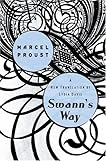Slow Read: Swann's Way, Week 2
 In Search of Lost Time: Volume 1, Swann's Way (Modern Library Classics) (v. 1)
In Search of Lost Time: Volume 1, Swann's Way (Modern Library Classics) (v. 1)
by Marcel Proust, translated by Scott Moncrieff
Combray, Section 2
It strikes me that many of the memories of the narrator are from his imagination. Also, any time he gets close to some real life drama, his parents remove the responsible actors from his life, thus necessitating more of his memories be of future fantasies.
M Legrandin --> poser?
Besides, she thought it in not very good taste that M. Legrandin, whose sister was married to a country gentleman of Lower Normandy near Balbec, should deliver himself of such violent attacks upon the nobles, going so far as to blame the Revolution for not having guillotined them all. ...This reminds me of some I know who had ideas about how things would be when they grew up, but when they got there it wasn't like that. (And how I did not have these fantasies about how it would be, just that I had to get out.)
"Oh, I admit," he went on, with his own peculiar smile, gently ironical, disillusioned and vague, "I have every useless thing in the world in my house there. The only thing wanting is the necessary thing, a great patch of open sky like this. Always try to keep a patch of sky above your life, little boy," he added, turning to me. "You have a soul in you of rare quality, an artist's nature; never let it starve for lack of what it needs."
At this date I was a lover of the theatre: a Platonic lover, of necessity, since my parents had not yet allowed me to enter one, and so incorrect was the picture I drew for myself of the pleasures to be enjoyed there that I almost believed that each of the spectators looked, as into a stereoscope, upon a stage and scenery which existed for himself alone, though closely resembling the thousand other spectacles presented to the rest of the audience individually.I find it interesting that he terms his inexperience in how things actually were as Platonic.
My heart beat loud while I counted out to myself "Shall I do it, shall I not?" and then I ceased to ask myself what I ought to do so as at least to do something. Blindly, hotly, madly, flinging aside all the reasons I had just found to support such action, I seized and raised to my lips the hand she held out to me. "Isn't he delicious! Quite a ladies' man already; he takes after his uncle. He'll be a perfect 'gentleman,'"So then he goes and blurts it all out to his parents and they and his uncle is estranged.
He is quite an astute boy, recognizing the way books make emotional truths larger than life, more obvious, whereas in real life, changes come more slowly. Or I would say, dramatic changes happen less often than fictional narratives. Hmmm, could be why I myself latch on to drama so quickly...I read constantly just like this boy.
It is the same in life; the heart changes, and that is our worst misfortune; but we learn of it only from reading or by imagination; for in reality its alteration, like that of certain natural phenomena, is so gradual that, even if we are able to distinguish, successively, each of its different states, we are still spared the actual sensation of change.Hmmm the conquest of truth, rather expensive, or a life based on internal fictions? Interesting passage, I want to revisit this perhaps:
Had my parents allowed me, when I read a book, to pay a visit to the country it described, I should have felt that I was making an enormous advance towards the ultimate conquest of truth. For even if we have the sensation of being always enveloped in, surrounded by our own soul, still it does not seem a fixed and immovable prison; rather do we seem to be borne away with it, and perpetually struggling to pass beyond it, to break out into the world, with a perpetual discouragement as we hear endlessly, all around us, that unvarying sound which is no echo from without, but the resonance of a vibration from within. We try to discover in things, endeared to us on that account, the spiritual glamour which we ourselves have cast upon them; we are disillusioned, and learn that they are in themselves barren and devoid of the charm which they owed, in our minds, to the association of certain ideas; sometimes we mobilise all our spiritual forces in a glittering array so as to influence and subjugate other human beings who, as we very well know, are situated outside ourselves, where we can never reach them.Bloch, another man destined for banishment. The 'rents just don't answer the door when these ne'er-do-wells come calling to steal their baby's innocence.
Unfortunately I was not able to set at rest, by further talks with Bloch, in which I might have insisted upon an explanation, the doubts he had engendered in me when he told me that fine lines of poetry (from which I, if you please, expected nothing less than the revelation of truth itself) were all the finer if they meant absolutely nothing. For, as it happened, Bloch was not invited to the house again.Okay, have I just missed the narrator's name or has it not been mentioned? It's like trying to find the pineapple in Psych...I keep forgetting to watch for it, but I don't want to backtrack just to look for the pineapple because by the time I've watched it I'm too late to try for the prize anyway.
Previous posts:
Schedule
Week 1




No comments:
Post a Comment